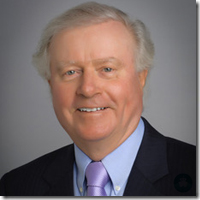 |
 |
 |
 |
 |
 |
 |
 |
 |
 |
| Alan (Bud) Taylor |
 |
| US & Canada History |
 |
|
 |
 |
| Coming from: |
 |
Henrico, Virginia USA |
 |
 |
| Contact details: |
 |
|
 |
| EXPERTISE |
| History - General |
| Politics & Current Affairs |
|
 |
 |
 |
| PREVIOUS EXPERIENCE WITH: |
 
|


Bud is a Canadian citizen who was naturalized in the United States in 2000. He has a post graduate degree in political science with an emphasis on history and governance. In his professional career (for example, as a Partner at Deloitte) Bud advised executives of global marquee companies like: Microsoft Europe, Korea Telecom, Whirlpool, the Overseas Chinese Banking Corporation, and Saudia Air on how to improve the performance of their organizations. This experience gave Bud the opportunity to live in and develop integrate insights into distinct histories, cultures, and political systems.
Bud has authored many publications including his award-winning book “Customer Driven Change.” He used this body of work to establish a professional speaking career where he talked about human centered management topics in cities such as: Istanbul, Johannesburg, Hong Kong, Miami, Paris, Athens, and Mexico City.
Bud continues his speaking career with dozens of hours of PowerPoint supported talks to enrich cruise itineraries in Eastern North America down through the Caribbean. Major theme areas are discussed below.


Enrichment Site - Presentations
Canada-US Relations
This series of talks begins with the Viking settlement in L’Anse aux Meadows around 1000 BC. They continue into the French landings in Quebec around 1535 that lead to the lucrative fur trade and eventually the first US millionaire, John Astor. The British make their way to North America in the early 1600’s followed by the Dutch a few decades later. These explorers and settlers meet in wars that are often derivates of their ancestors in Europe. Each of these wars change the face on the continent and define the relationship between Canada and the US.
These events have led to two countries with different founding values (“life, liberty, and the pursuit of happiness” vs “peace, order, and good government.”) The protests of the ‘60’s broke apart their common British heritage and landed the countries in separate places: the US becoming divided and Canada having a much softer landing.
The US Civil War
There are many cruise destinations that invoke the spirit of the Civil War. Firstly, anything up the St. Lawrence and along the eastern seaboard brings with it the unique relationship Canada had in the war. There were about 35,000 Canadians who fought for the Union and 5,000 for the Confederacy. Contraband and piracy drove profits in Canada’s Atlantic provinces while Toronto was a hotbed of conspiracies with the Copperheads and Montreal was the focus of Jefferson Davis’s strategy to drag the conflict past the 1860 election in search of a political solution.
Working down the seaboard opportunities to explore the war are presented at places like Norfolk, Virginia. Here the Army of Northern Virginia established itself during the “seven days war” by driving McClellan out of the Virginia Peninsula. Two years later the revers happens when Grant sieges Petersburg and forces Lee to surrender his army at Appomattox. Further down the coast Charleston gives us a chance to introduce the battles that raged through the south.
Corsairs of the Caribbean
Bud has visited many of the islands of the Caribbean and has studied the history of the region. Caribbean talks start with the 300 years of “privateers, corsairs, and pirates” to show how these adventurers served their interests and their European benefactors. Bud looks at all the big names in pirating explorations along with issues such as pirate justice. Bud uses his political science background to explore the concept of the “pirate republic” before this romanticized era was brought to an end with the suppression of piracy – only to be resurrected with threats from current day pirates.
Colonialism in the Caribbean
This series begins with a strategic look at the impacts of colonialism in the region to help passengers appreciate the history, culture, and governance of the islands that tried to fill Europe’s insatiable appetite for: sugar, cotton, and tobacco. There is a high level “compare & contrast” of the four major colonizer in the region: Spain, the Netherlands, the French, and the British (also the limited story of Denmark and the introduction of the United States into the zone.) Themes across the blocks include: the slave trade, enrichment of Europe through the trade triangle, emancipation, cultural legacies (language, cuisine, music, religion, and architecture) and the current challenges of dependence on agriculture and fossil fuels.
Bud then has separate modules which look at the major islands within each block. The modules detail the islands of the cruise itinerary through a set of modern lenses: demographics, geography, unique features, current governing structures, challenges, hopes and aspirations.


Viking Booking - Eastern Seaboard Explorer: September 15 to October 6, 2025